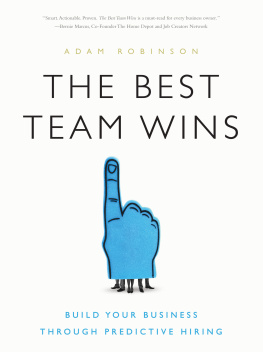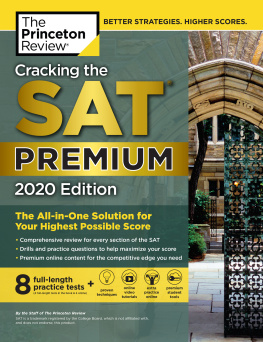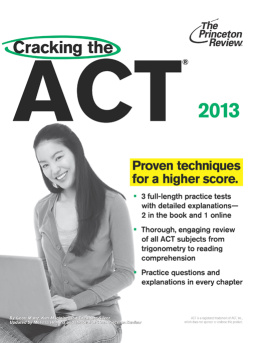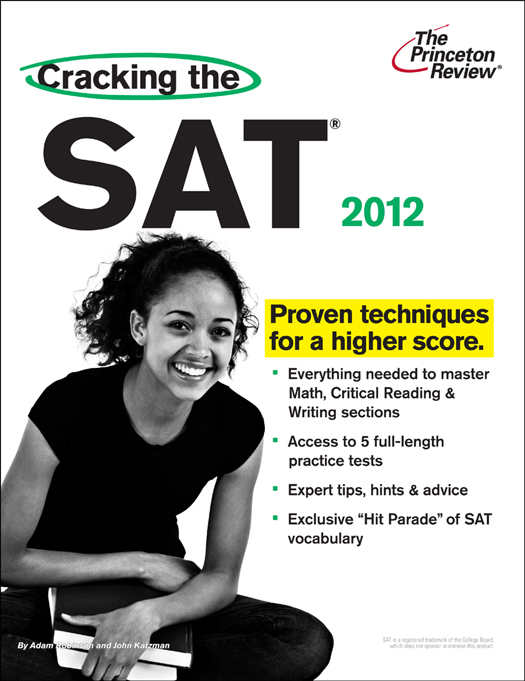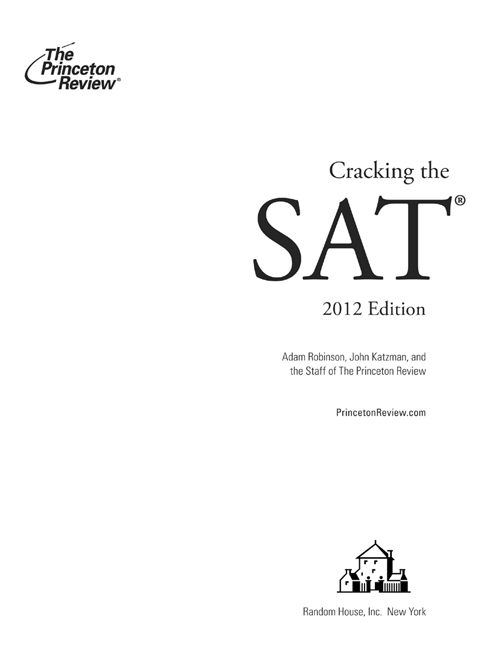
Editorial
Rob Franek, VP Test Prep Books, Publisher
Seamus Mullarkey, Associate Publisher
Laura Braswell, Senior Editor
Selena Coppock, Editor
Heather Brady, Editor
Research & Development
Ed Carroll, Executive Director of High School Programs & Development
Random House Publishing Team
Tom Russell, Publisher
Nicole Benhabib, Publishing Manager
Ellen L. Reed, Production Manager
Alison Stoltzfus, Associate Managing Editor
The Princeton Review, Inc.
111 Speen Street, Suite 550
Framingham, MA 01701
E-mail:
Copyright 2011 by The Princeton Review, Inc.
Cover design 2011 by Random House, Inc. Cover art Andrew Rich/iStock Photo.
The Princeton Review is not affiliated with Princeton University.
All rights reserved. Published in the United States by Random House, Inc., New York, and in Canada by Random House of Canada Limited, Toronto.
Terms of Service: The Princeton Review Online Companion Tools (Online Companion Tools) for the Cracking book series and 11 Practice Tests for the SAT & PSAT are available for the two most recent editions of each book title. Online Companion Tools may be activated only once per eligible book purchased. Activation of Online Companion Tools more than once per book is in direct violation of these Terms of Service and may result in discontinuation of access to Online Companion Tools services.
The SAT questions throughout the book were selected from the following publications of the College Entrance Examination Board: 5 SATs, 1981; 6 SATs, 1982; 5 SATs, 1984; 10 SATs, 1983; 5 SATs, 1992. These questions, as well as test directions throughout the book, are reprinted by permission of Educational Testing Service, the copyright owner of the sample questions. Permission to reprint the material does not constitute review or endorsement by Educational Testing Service or the College Board of this publication as a whole or of any other sample questions or testing information it may contain.
All other questions in the book were created by the authors.
eISBN: 978-0-375-42765-7
ISSN 1936-4091
Editor: Laura Braswell
Production Editor: Kathy G. Carter
Production Coordinator: Deborah A. Silvestrini
2012 Edition
v3.1
Acknowledgments
An SAT course is much more than clever techniques and powerful computer score reports. The reason our results are great is that our teachers care so much about their students. Many teachers have gone out of their way to improve the course, often going so far as to write their own materials, some of which we have incorporated into our course manuals as well as into this book. The list of these teachers could fill this page.
The Princeton Review would never have been founded without the advice and support of Bob Scheller. Bobs program, Pre-test Review, provides the best sort of competition; his fine results make us work all the harder.
Thanks to Ed Carroll and Eric Ginsberg for reviewing and updating this years edition.
Finally, we would like to thank the people who truly have taught us everything we know about the SAT: our students.
Special thanks to Adam Robinson, who conceived of and perfected the Joe Bloggs approach to standardized tests and many of the other successful techniques used by The Princeton Review.
Contents
Foreword
Welcome to the 2012 edition of Cracking the SAT. The SAT is not a test of aptitude, how good of a person you are, or how successful you will be in life. The SAT simply tests how well you take the SAT. And performing well on the SAT is a skill, one that can be learned like any other. The Princeton Review was founded more than 20 years ago on this very simple idea, andas our students test scores showour approach is the one that works.
Sure, you want to do well on the SAT, but you dont need to let the test intimidate you. As you prepare, remember these two important things about the SAT:
- It doesnt measure the stuff that matters. It measures neither intelligence nor the depth and breadth of what youre learning in high school. It doesnt predict college grades as well as your high school grades do, and many schools are still hesitant to use the score from your 25-minute essay in their application decisions at all. Colleges know there is more to you as a studentand as a personthan what you do at a single 4-hour test administration on a random Saturday morning.
- It underpredicts the college performance of women, minorities, and disadvantaged students. Historically, women have done better than men in college but worse on the SAT. For a test that is used to help predict performance in college, thats a pretty poor record.
Your preparation for the SAT starts here. We at The Princeton Review spend millions of dollars every year improving our methods and materials. Our teachers take each and every SAT to make sure nothing slips by us, and our books contain the most accurate, up-to-date information available. Were always ready for the SAT, and well get you ready, too.
However, there is no magic pill: Just buying this book isnt going to improve your scores. Solid score improvement takes commitment and effort from you. If you read this book carefully and work through the problems and practice tests included in the book, not only will you be thoroughly versed in the format of the SAT and the concepts it tests, you will also have a sound overall strategy and a powerful arsenal of test-taking skills that you can apply to whatever you encounter on test day.
In addition to the thorough review in Cracking the SAT, weve tied the book to drills and tests on our websitePrincetonReview.comto make it even more efficient at helping you to improve your scores. Before doing anything else, be sure to register at PrincetonReview.com/cracking. When you do, youll gain access to the most up-to-date information on the SAT, detailed score reports for the tests in this book, exercises that will reinforce our techniques, and the opportunity to have your essays scored by our LiveGrader service. Youll also find great information on college admissions, online applications, and financial aid.
The more you take advantage of the resources weve included in this book and the online companion tools that go with it, the better youll do on the test. Read the book carefully and learn our strategies. Take full-length practice tests under actual timed conditions. Analyze your performance and focus your efforts where you need improvement; consider studying with a friend to stay motivated.
This test is challenging, but youre on the right track. Well be with you all the way.
Good luck!
The Staff of The Princeton Review
So Much More Online!

More Lessons
- Step-by-step guide to solving difficult math and verbal problems
- Tutorials that put our strategies into action
More Practice


